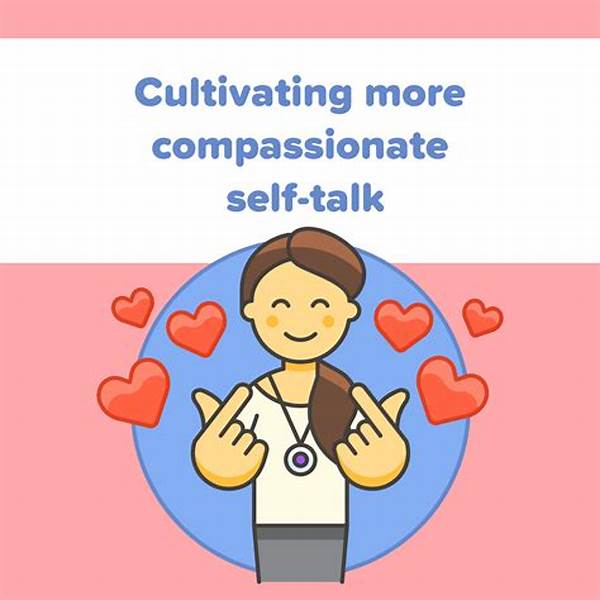
Cultivating A Compassionate Self-dialogue
- Daniel Anderson
- 0
- Posted on
In the hustle and bustle of everyday life, it’s easy to let critical thoughts take center stage. But what if we shifted gears and dialed into a kinder narrative? Cultivating a compassionate self-dialogue is all about that—learning to treat ourselves with the same gentleness and understanding we reserve for our closest friends. This shift in perspective is not only liberating but also essential for emotional well-being.
Read Now : Simple Solutions For Hangover Pain
Embracing Kindness: The Heart of Self-Dialogue
Cultivating a compassionate self-dialogue is like being your own best mate. Imagine telling yourself, “Hey, it’s alright!” when you mess up instead of going into full-on self-diss. It’s about flipping the script from self-criticism to empathy. Oftentimes, we hold ourselves to super high standards, and as a result, we dwell on our mistakes. However, pivoting to a more compassionate self-talk can genuinely change the game. Encouraging yourself with positive affirmations and gentle reminders is like planting seeds for personal growth and self-acceptance—nurturing that inner space where you can thrive without fear of harsh judgment. This practice allows individuals to connect deeper with their authenticity, paving the way for a healthier, more resilient mindset.
Simple Slang Steps for Self-Kindness
1. Keep it chill, dude! Talk to yourself like you’d chat with a mate—light and understanding.
2. Breathe, bro! Cultivating a compassionate self-dialogue isn’t about rushing; it’s a steady groove.
3. Tune out the haters (even when they’re in your head).
4. Be your own cheerleader. You’ve got this!
5. Keep it real; self-kindness is your jam.
The Journey of Gentle Self-Talk
You don’t have to go full Zen to start cultivating a compassionate self-dialogue. It’s more about baby steps, ya know? Embracing a kinder self-dialogue means catching negative thoughts in the act and flipping them on their heads. Oftentimes, people are their own harshest critics without even noticing it. The real glow-up happens when you replace those critical voices with tones of understanding and encouragement. Imagine having inner conversations that uplift rather than tear down—how cool would that be? When you’re vibing with positivity, it reflects in the way you interact with the world, bringing about a deeper sense of peace and fulfillment.
Growing into this positive mindset doesn’t mean you go all Pollyanna on yourself—acknowledging and understanding when you mess up are vital parts of the journey. What’s key is showing the same empathy and patience that you’d offer a friend. While it might feel a bit awkward in the beginning, it’s worth sticking with. Over time, bonding with your inner self through nurturing conversations can enhance self-awareness and emotional intelligence.
Navigating the Slang Pathway to Inner Peace
1. We’re all figuring it out—cut yourself some slack!
2. No pressure, no diamonds: challenges are growth playgrounds.
3. Half the battle of cultivating a compassionate self-dialogue is telling perfectionism to take a hike.
Read Now : Symbolic Color Palette Of Misery
4. You’re human; it’s cool to not be perfect.
5. Don’t sweat the small stuff—it’s all part of life’s rich tapestry.
Breaking Down the Slang Journey
Incorporating slang into self-dialogue can actually enrich the way we engage with ourselves, making it more relatable and relaxed. Cultivating a compassionate self-dialogue means embracing authenticity in your communication style. Instead of rigid and formal thoughts, throw in some colloquial flair. It’s about letting conversations with yourself feel as natural as chatting with a buddy. Slang keeps things fresh and dynamic, allowing room for humor and lightness—a recipe for reducing stress and boosting positivity. The use of phrases like “you got this” or “no worries” can break the cycle of negativity, offering support rather than critique.
Cultivating a compassionate self-dialogue with a touch of slang reminds you that you’re in a conversation, not a tribunal. This lighthearted approach replaces self-judgment with understanding, encouraging a mindset that’s prepared to grow and learn from experiences. It’s a small shift that, when practiced consistently, has the power to impact self-esteem, inspiring an uplifting perspective on personal challenges and successes.
Building a Compassionate Connection with Yourself
Cultivating a compassionate self-dialogue is about making friends with your inner critic and calming it down with some laid-back vibes. It’s about acknowledging that everyone’s got that pesky little voice inside telling them they’re not enough—but you can choose to tune it out. Instead, crank up the volume on those supportive, uplifting words you’re channeling in, using an easygoing language that feels like a chill chat at your fave hangout spot. When you swap self-bashing for groovy positivity, you create space for true self-acceptance.
The practice of cultivating a compassionate self-dialogue takes patience and a bit of finesse, but it’s a surefire way to tap into your best self. Imagine every “oops” moment turning into an opportunity for growth and every setback being reframed as a stepping stone. Kicking out negative self-talk and opting for a more slang-infused compassionate dialogue can reduce stress and anxiety. This relaxed approach can be both transformational and empowering, not just for nurturing self-kindness but for embracing life’s messy, yet beautiful journey.
Creating a Resilient and Supportive Inner Narrative
When you kick off the journey of cultivating a compassionate self-dialogue, it’s all about finding your groove. Slang doesn’t just soften the blow of self-criticism; it adds a touch of warmth and humor. Imagine telling yourself, “Chill, you’ll nail it next time!” instead of a harsh reprimand. The act of reframing negative self-talk with a sprinkle of slang can be liberating, encouraging you to see setbacks as stepping stones rather than stumbling blocks. Adopting this approach consistently fosters resilience.
Moreover, making self-conversations less formal and more familiar gives your inner dialogue a relaxed tone that can resonate deeper. Engaging with yourself this way builds emotional strength and cultivates a compassionate self-dialogue that’s sustainable. It’s a journey toward more positive, friendly interactions with yourself, creating space for both growth and contentment.